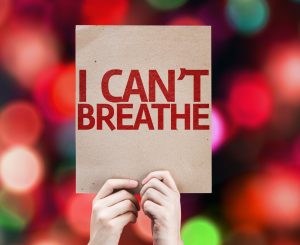There is no doubt that police reform is a necessary reality. Police responses to mental health emergencies can end tragically for the person suffering from a mental health issue. Those suffering from mental health issues cannot be treated like criminals nor expected to respond perfectly when confronted. Some of the burden falls on bad policing such as seen in the George Floyd case, while others are due to poor training to respond to mental health calls. The demand to comply and when someone with mental issues does not comply can lead to deadly consequences for the mentally ill. Police not only need to be better trained in de-escalation but also need training in Crisis Intervention and identifying mental illness cases. In addition, bad cops need to be removed.

One other option is the creation of mental health response teams that specialize in mental health calls. Instead of the standard policing, these professionals are trained in mental health, crisis intervention, and de-escalation. While it is a very difficult job for police to enter upon a scene where possible danger lurks, the public demands more than the average tolerance when police arrive, especially when confronting someone on drugs or facing a mental crisis. The article, “The Overlooked, Enduring Legacy of the George Floyd Protests” by Tahir Duckett looks at the need since 2020 to find alternative response teams to deal with mental health calls. Duckett states,
“The shift towards non-police responses to mental health and other calls for service is a consequential one. One in five police killings involve a person in mental health crisis. But just as important, a system of alternative first response represents a framework in which cities begin to respond to people with the care they need–not just the gun, badge, and handcuffs we have available.”
“The Overlooked, Enduring Legacy of the George Floyd Protests”. Duckett, T. (2023). Time.
To read the entire article, please click here
Crisis Intervention and mental health training for key response teams to mental emergency calls can provide better care and response to the community, limiting fatal encounters with law enforcement and those in mental crisis. The police are not equipped with the training to handle many of these issues and resort to comply or not comply suppression of a alleged perpetrator. In many cases, these non-criminals, are tackled, shocked, choked, beaten or shot because they do not comply due to their mental distress. Better training within the departments for mental health response is key but also again a reform of departments to remove aggressive and abusive officers.
Cities should choose between two options. All options involve Crisis Intervention and Mental Health training for all officers, but response teams should be police teams especially trained for ONLY mental health calls, or hybrid teams with police and a social worker or mental health care professional providing support.
Commentary
Crisis lines are lifelines for individuals experiencing a mental health crisis. They serve as a bridge between the person in crisis and the appropriate help they need. These helplines offer a safe and confidential space for individuals to express their thoughts and emotions without fear of judgment. Trained crisis line operators provide active listening, empathy, and validation, which can be immensely comforting for someone in distress.
Moreover, crisis lines serve as a gateway to mental health services. The operators can provide information and referrals to mental health professionals, community resources, and support groups. They can guide callers to appropriate interventions, such as therapy, counseling, or psychiatric services. By connecting individuals with the right resources, crisis lines play a crucial role in supporting mental health and preventing crises from escalating.
The significance of crisis lines in police and crisis intervention
Law enforcement agencies often find themselves responding to crises involving mental health issues. Crisis lines play a significant role in assisting police officers in these situations. When faced with a mental health crisis, officers can reach out to crisis lines for guidance and support. Trained professionals on the other end of the line can provide valuable insights on how to approach the situation, ensuring the safety of both the individual in crisis and the officers involved.
Crisis lines also act as a valuable resource for police officers who may not have extensive training in mental health crisis intervention. By consulting with crisis line operators, officers can gain a better understanding of the individual’s needs and receive guidance on de-escalation techniques. This collaboration between crisis lines and law enforcement helps to prevent unnecessary use of force and promotes a more compassionate approach to crisis intervention.
Crisis line services and their impact on mental health crises
Crisis lines offer a wide range of services that have a profound impact on mental health crises. Firstly, crisis lines provide immediate emotional support to individuals in distress. The simple act of having someone to talk to during a crisis can be incredibly comforting and help alleviate feelings of isolation and despair. Crisis line operators are trained to listen actively, validate emotions, and provide a non-judgmental space for individuals to express their thoughts and feelings.
Secondly, crisis lines offer information and referrals to appropriate mental health resources. Individuals in crisis may not be aware of the available support systems and treatment options. Crisis line operators can provide valuable information about local mental health services, support groups, and even financial assistance programs. By connecting individuals to the right resources, crisis lines help facilitate access to care, which is crucial for managing mental health crises effectively.
Lastly, crisis lines play a critical role in suicide prevention. Many crisis lines have specialized training in suicide intervention techniques. Operators are equipped to assess the level of risk and provide appropriate intervention strategies. They can offer support, encouragement, and guidance to individuals contemplating suicide, while also connecting them with emergency services or local mental health professionals.
The connection between crisis lines and de-escalation training for police officers
One of the key aspects of crisis intervention is de-escalation. De-escalation techniques aim to defuse tense situations and reduce the need for physical force. Crisis lines and de-escalation training for police officers go hand in hand in promoting safer crisis interventions.
Crisis lines provide valuable insights and guidance to officers on de-escalation strategies. By consulting with crisis line operators, officers can gain a better understanding of the individual’s emotional state and tailor their approach accordingly. Crisis line operators can offer suggestions on how to communicate effectively, maintain calmness, and diffuse potentially volatile situations. By incorporating crisis line guidance into their practice, officers can employ more empathetic and compassionate techniques, resulting in safer and more successful crisis interventions.
Benefits of crisis lines in reducing police use of force incidents
The integration of crisis lines in police and crisis intervention has numerous benefits, including a reduction in police use of force incidents. Crisis line operators are specially trained to handle crisis situations and provide support to individuals in distress. By collaborating with crisis line professionals, police officers gain access to valuable expertise that can help them navigate potentially volatile encounters with individuals experiencing a mental health crisis.

When officers have the support and guidance of crisis lines, they are more likely to approach situations with empathy and understanding. Crisis line operators can offer alternative strategies to de-escalate situations, reducing the need for physical force. By employing these techniques, officers can promote a more peaceful resolution and minimize the risk of harm to both themselves and the individuals they are assisting.
Studies have shown that crisis lines, when integrated effectively into crisis intervention protocols, can significantly reduce the incidence of police use of force. By providing officers with the resources and knowledge necessary to handle mental health crises, crisis lines play a vital role in creating safer outcomes for all parties involved.
Case studies showcasing the effectiveness of crisis lines in mental health support
Numerous case studies highlight the effectiveness of crisis lines in providing mental health support and preventing crises from escalating. One such example is the Crisis Text Line, a text-based crisis line service. Research conducted on the Crisis Text Line has shown that individuals who reach out for support experience a significant decrease in suicidal ideation and an increase in their ability to cope with their mental health challenges.
Another case study examined the impact of crisis lines in reducing emergency department visits for individuals in crisis. By providing immediate emotional support and helping individuals access appropriate resources, crisis lines were able to divert individuals from seeking emergency care unnecessarily. This not only reduces the burden on emergency departments but also ensures that individuals receive the most appropriate and timely care for their mental health needs.
These case studies demonstrate the effectiveness of crisis lines in providing timely and accessible mental health support. By intervening early and providing support when it is most needed, crisis lines have the potential to save lives and improve the overall well-being of individuals experiencing a mental health crisis.
Challenges and limitations of crisis lines in police and crisis intervention
While crisis lines play a crucial role in promoting mental health support, they also face certain challenges and limitations. One of the challenges is the availability of resources. With the increasing demand for crisis line services, it can be difficult to ensure that there are enough trained professionals to handle the volume of calls effectively. Long wait times or limited availability may hinder individuals from accessing immediate support when they need it most.
Moreover, crisis lines may not always be able to address the complex needs of individuals in crisis. While crisis line operators are trained to provide emotional support and referrals, they may not have the expertise to provide long-term counseling or therapy. In these cases, it is essential to ensure that individuals are connected with appropriate mental health professionals who can provide ongoing care and support.
Additionally, crisis lines may face challenges in collaborating with law enforcement agencies. Building effective partnerships between crisis lines and police departments requires ongoing communication, training, and shared protocols. Without proper coordination, the potential benefits of crisis lines in crisis intervention may not be fully realized.
Future developments and improvements in crisis line services
As the demand for crisis line services continues to grow, there is a need for ongoing development and improvement. One area of improvement is the use of technology to enhance crisis line services. Text-based crisis lines, like the Crisis Text Line mentioned earlier, have shown great promise in reaching individuals who may not feel comfortable speaking on the phone. Incorporating video chat or other digital platforms can further enhance accessibility and convenience for those seeking support.
Another area of development is the integration of crisis lines with other mental health support systems. By strengthening connections between crisis lines, mental health professionals, and community resources, individuals can receive more comprehensive and coordinated care. This collaboration can help ensure that individuals experiencing a mental health crisis receive the most appropriate support and follow-up care.
Furthermore, ongoing training and professional development for crisis line operators are essential. As the field of mental health evolves, crisis line operators need to stay up to date with the latest research, best practices, and cultural competency training. This ongoing education can enhance their ability to provide effective support and adapt to the changing needs of the individuals they serve.
Conclusion: The ongoing need for crisis lines in promoting mental health support
In conclusion, crisis lines play a vital role in police and crisis intervention by promoting mental health support. They provide immediate emotional support, information, and referrals to individuals in distress. Crisis lines also assist police officers in de-escalation techniques, reducing the use of force incidents. Despite challenges and limitations, crisis lines have proven to be effective in preventing crises from escalating and improving outcomes for individuals experiencing a mental health crisis.

As the demand for mental health support continues to rise, it is crucial to invest in the ongoing development and improvement of crisis line services. By leveraging technology, strengthening collaborations, and providing continuous training, crisis lines can better meet the needs of individuals in crisis and ensure that they receive timely and appropriate support. With their invaluable role in promoting mental health, crisis lines are an essential component of crisis intervention and a lifeline for those in need.
Please also review AIHCP’s Crisis Intervention Specialist Program and see if it meets your academic and professional goals. The program is designed for qualified professionals seeking a four year certification in Crisis Intervention. It is an online and independent study program designed to help working professionals earn a certification to enhance their professional career.
Additional Resources
“A Look at Police Reform and Mental Health Crises—Has Any Progress Been Made?”. Styx, L. (2022). VeryWellMind. Access here
“Amid calls for police reform, better training needed to handle mental health emergencies: Experts”. Pereira, I. (2020). ABC NEWS. Access here
“Mental Health And Police Violence: How Crisis Intervention Teams Are Failing”. Westervelt, E. (2020). NPR. Access here
“A look at the effort to expand mental health workers’ role in policing”. Hughes, T. (2022). USA Today. Access here
